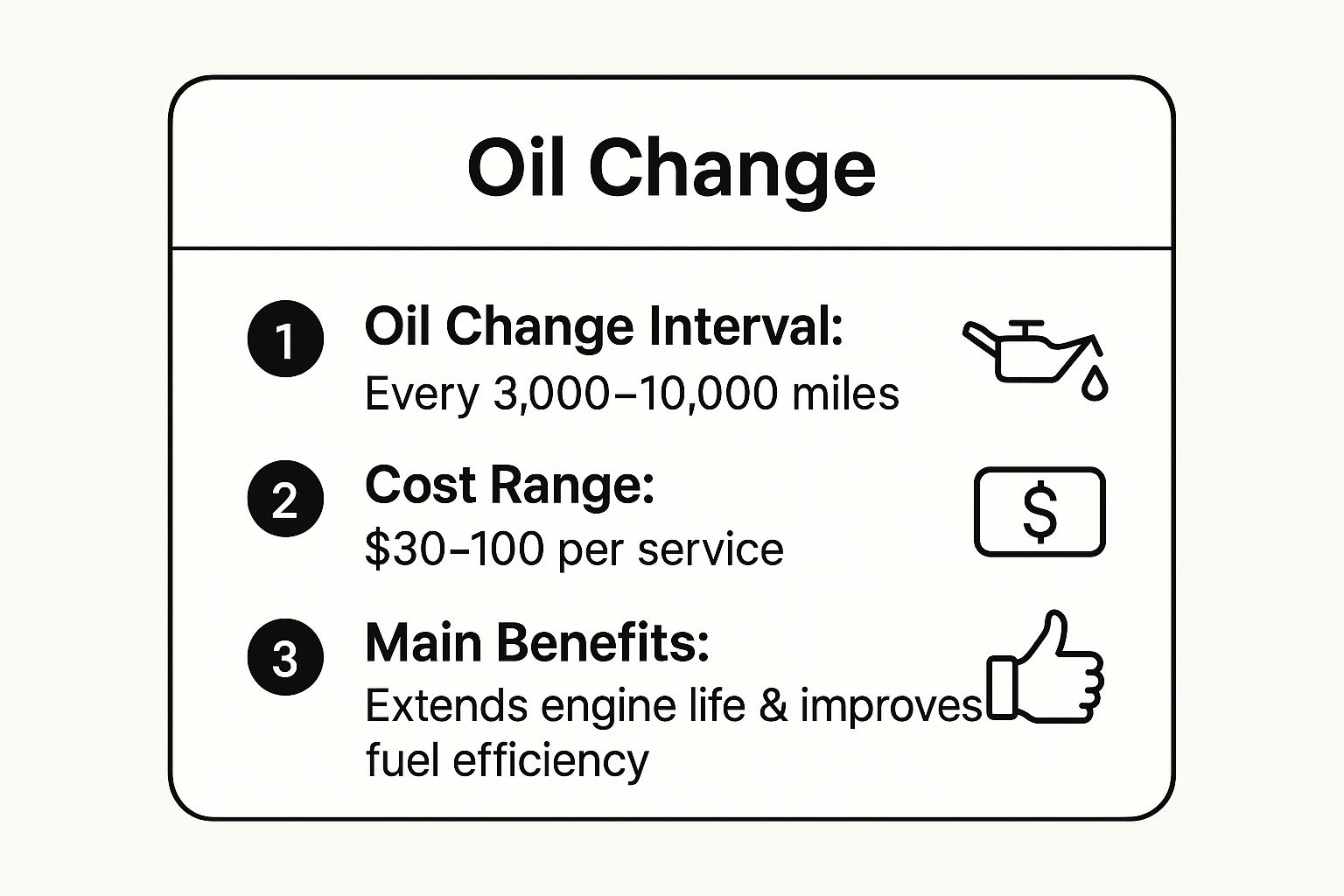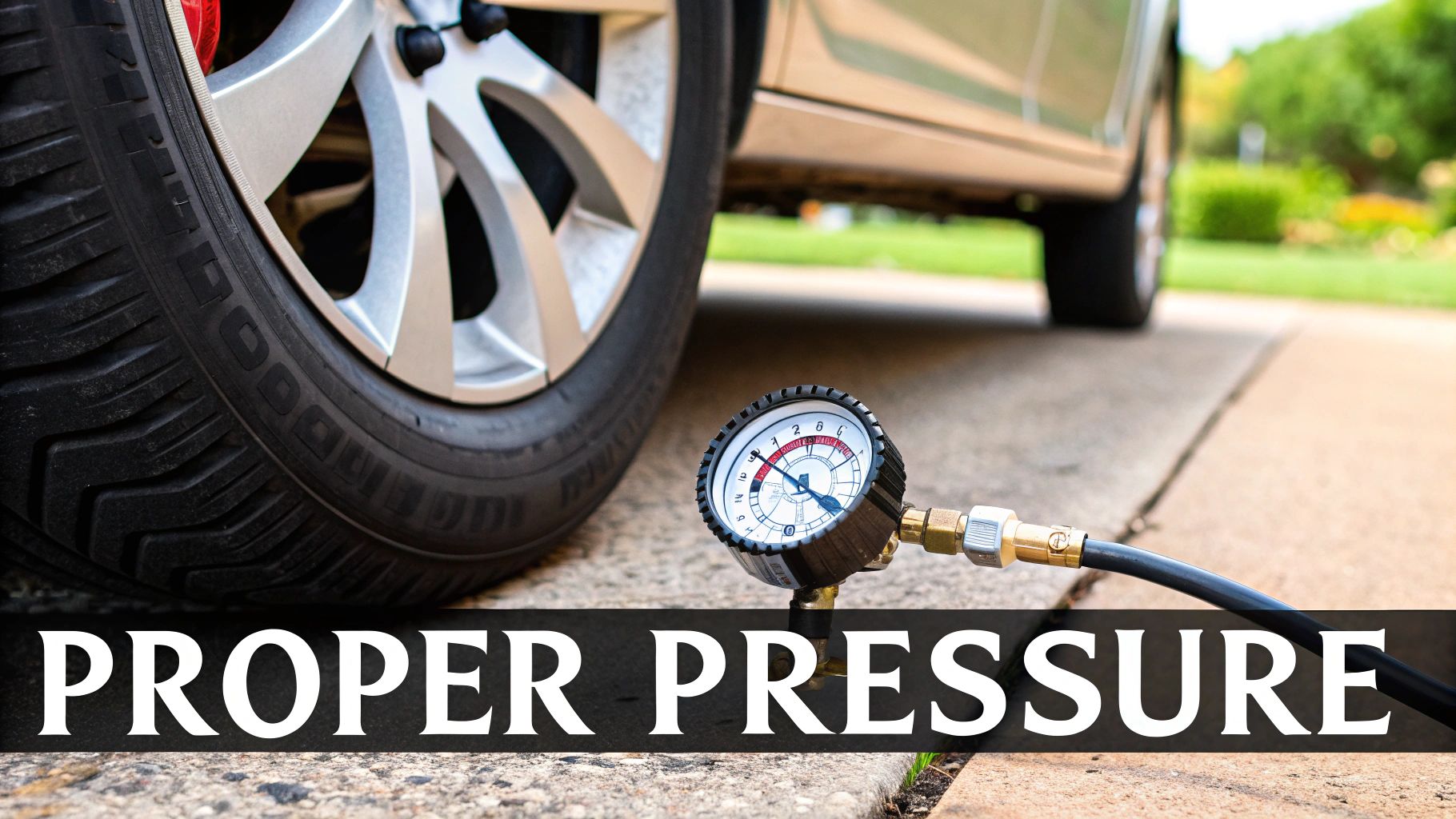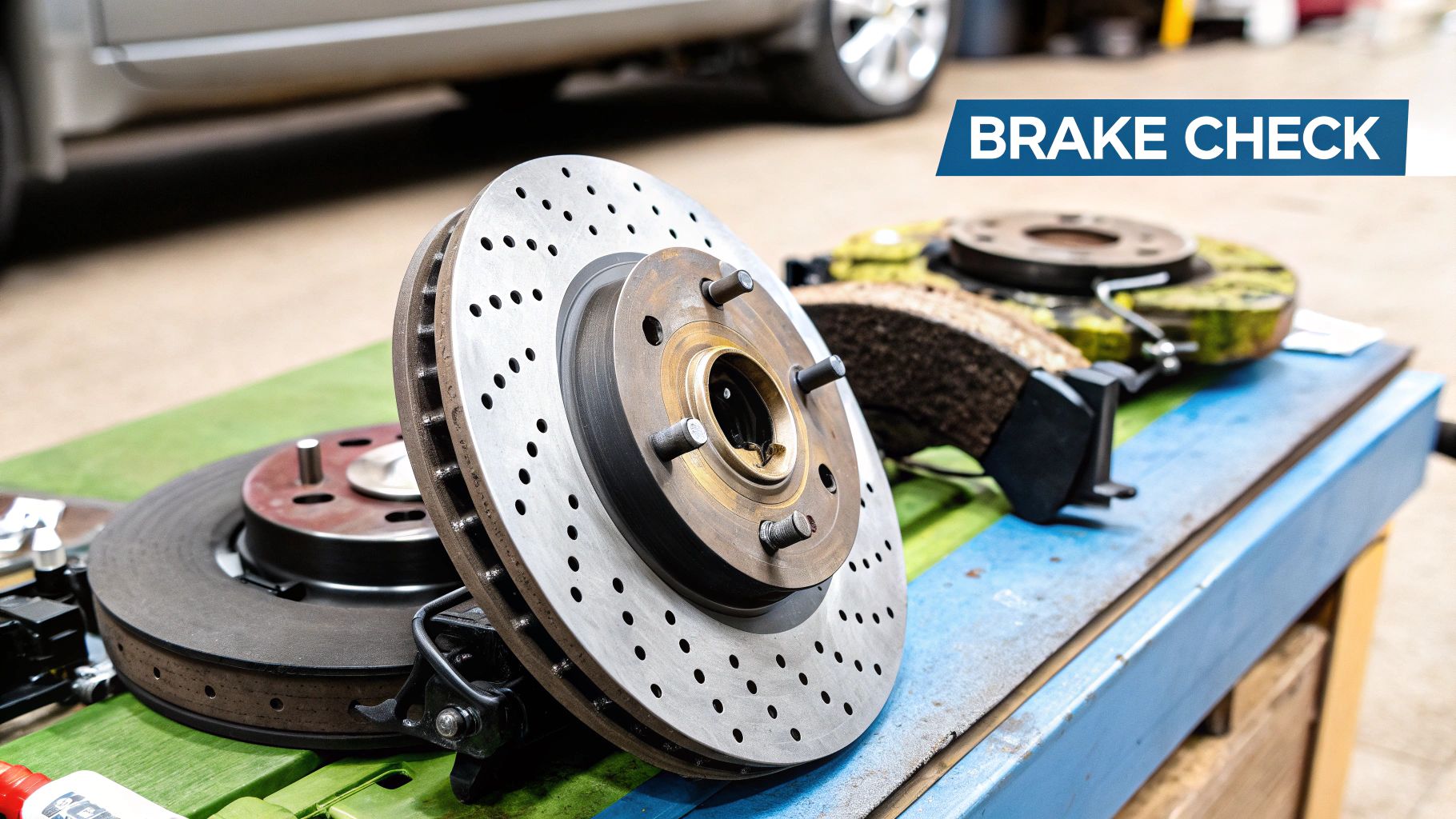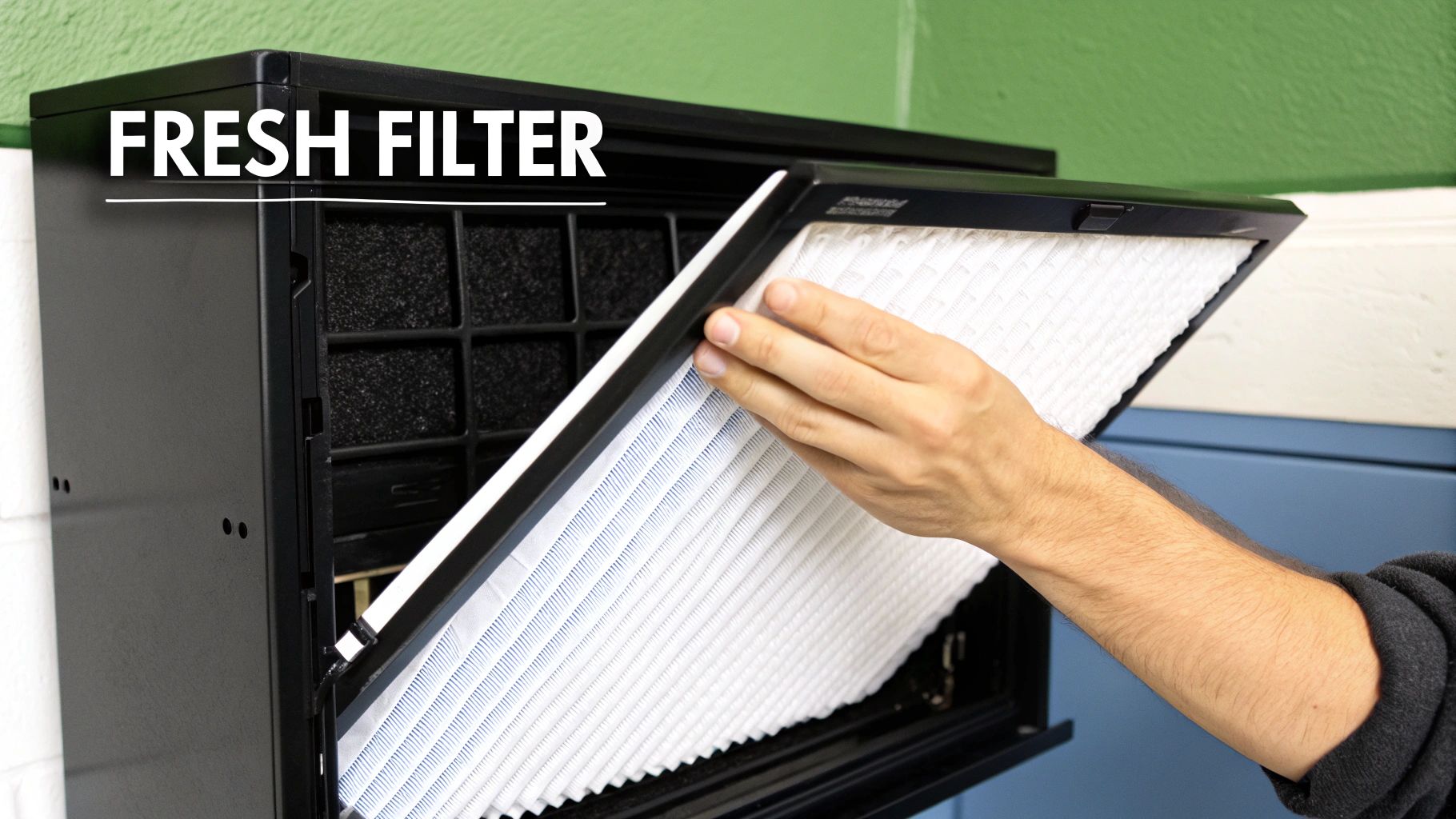7 Car Maintenance Tips for Bedfordshire Drivers in 2025
- coledem
- Jul 16, 2025
- 13 min read
For drivers across Bedfordshire, from the daily commute through Bedford to weekend drives around Biggleswade, keeping your car in top condition is a priority. Consistent care supports safety and prevents small issues from becoming expensive problems. This guide offers straightforward, useful car maintenance tips tailored for local road conditions. We will cover routine tasks such as checking your oil, maintaining tyre pressure, and inspecting your brakes, fluids, and battery.
These steps will help you manage your vehicle's health, whether you handle basic checks yourself or rely on a trusted local garage. Proper maintenance means more reliability on Bedfordshire's roads, giving you peace of mind throughout the year. Beyond the regular schedule, seasonal checks are a key part of responsible ownership. After reading our general guide, you can discover important spring car checks that every driver should do. Understanding these practices will equip you with the knowledge to maintain your vehicle's performance and longevity, helping you avoid unexpected breakdowns and costly repairs. This curated collection of advice is designed for practical use by every type of driver in the region.
1. Regular Oil Changes
Changing your vehicle's engine oil at recommended intervals is the single most effective car maintenance tip for preserving engine health and longevity. Engine oil is the lifeblood of your vehicle; it lubricates moving parts, reduces performance-robbing friction, draws heat away from the combustion chamber, and traps harmful contaminants like dirt and metal particles. Over time, this oil breaks down and becomes less effective, making periodic replacement necessary for peak performance.
During each oil change, the oil filter is also replaced. This component is responsible for screening out the contaminants the oil has collected, preventing them from circulating and causing premature wear to internal engine components. Neglecting this simple service allows sludge and damaging deposits to build up, leading to reduced efficiency and costly engine repairs down the road.
Why It's a Top Maintenance Task
The benefits of consistent oil changes are well-documented across the automotive industry. Fleet vehicle operators, who rely on vehicle uptime for their business, often see their vehicles exceed 300,000 miles by adhering to strict oil change schedules. Likewise, commercial trucking companies report significant extensions in engine life directly attributable to disciplined oil maintenance. For everyday drivers in Bedfordshire, this translates to a more reliable and longer-lasting vehicle.
Practical Tips for Bedfordshire Drivers
Check Your Oil Level Monthly: Use the dipstick to monitor the oil level between changes. Park on a level surface and wait for the engine to cool. A low oil level can be a sign of a leak or excessive consumption.
Use the Right Oil: Always refer to your vehicle’s owner's manual for the manufacturer-recommended oil type and viscosity (e.g., 5W-30). Using the correct oil is critical for modern engines.
Consider Severe Driving Conditions: Short trips, stop-and-go traffic around Bedford or Luton, and towing can be tough on engine oil. If this describes your typical driving, you may need to change your oil more frequently than the standard interval.
Keep Meticulous Records: Retain all receipts and log the date and mileage of every oil change. This documentation is often required to keep your vehicle’s warranty valid.
This infographic provides a quick overview of what's involved in a typical oil change service.

As the data shows, an oil change is a low-cost service that delivers high-value returns by extending engine life and supporting better fuel economy.
2. Tire Pressure and Rotation
Maintaining correct tyre pressure and rotating tyres periodically are fundamental car maintenance tips for even wear, good fuel economy, and safe handling. The air inside your tyres supports the entire weight of your vehicle. Proper pressure affects everything from braking distance to fuel consumption, while rotation helps maximise tyre life by distributing wear evenly across all four tyres.

Neglecting tyre care leads to poor vehicle stability, reduced grip on wet roads, and an increased risk of a dangerous blowout. Incorrectly inflated tyres also wear out much faster, forcing you to replace them sooner than necessary. This simple check is one of the most direct ways a driver can influence both safety and running costs.
Why It's a Top Maintenance Task
The real-world benefits of diligent tyre maintenance are proven. Major logistics companies like UPS report saving millions annually through rigorous fleet-wide tyre pressure monitoring. For everyday drivers, AAA studies show that keeping tyres properly inflated can improve fuel economy by up to 3.3 per cent. In motorsport, like NASCAR, teams meticulously manage tyre pressure to gain performance advantages and secure driver safety, demonstrating its critical role.
Practical Tips for Bedfordshire Drivers
Check Pressure When Cold: For an accurate reading, check tyre pressure before you start driving or after the car has been parked for at least three hours. Driving heats up the tyres and increases the internal pressure.
Use a Quality Gauge: Don't rely on the gauges at petrol stations, which can be inaccurate from frequent use. A reliable digital or dial pressure gauge is a small investment for precise measurements. Our guide offers more detail on how to check tyre pressure correctly.
Rotate Regularly: Plan to have your tyres rotated every 5,000 to 8,000 miles. This is a perfect task to combine with your regular oil change service.
Inspect for Uneven Wear: When checking pressure, look for signs like "feathering" or one side of the tread wearing faster than the other. This can indicate an alignment or suspension problem that needs professional attention.
3. Brake System Maintenance
A vehicle's ability to stop safely is its most critical safety feature, making regular brake system maintenance a non-negotiable aspect of responsible car ownership. The brake system is a complex network of components including pads, rotors (or discs), fluid, and lines that work together to slow your vehicle. Through the immense friction and heat generated during braking, these parts naturally wear down and require periodic inspection and replacement to maintain stopping power.

Neglecting your brakes can lead to longer stopping distances, a complete loss of braking ability, and catastrophic accidents. Proper care of this system is a top priority car maintenance tip for protecting yourself, your passengers, and other road users. This is why it's a fundamental check in any MOT test.
Why It's a Top Maintenance Task
The importance of reliable brakes is demonstrated in the most demanding environments. Emergency vehicles, for instance, are subjected to elevated maintenance protocols to guarantee their braking systems can withstand high-speed pursuits and sudden stops. In a similar way, the world of Formula 1 racing showcases extreme engineering where brake systems must perform flawlessly under immense thermal stress. For the average Bedfordshire driver navigating the A6 or making school runs in Sandy, these examples highlight the universal need for a perfectly functioning brake system.
Practical Tips for Bedfordshire Drivers
Listen to Your Brakes: A high-pitched squeal is often the first sign of worn brake pads. If you hear a grinding noise, it could mean the pads are completely worn away, causing metal-on-metal contact that can damage the rotors. You can learn more about what that squealing sound means for your brakes on our blog.
Feel for Changes: Pay attention to how the brake pedal feels. A soft or spongy pedal can indicate air in the brake lines or low fluid, while vibrations or pulsations felt through the pedal or steering wheel often point to warped brake rotors.
Monthly Fluid Check: The brake fluid reservoir is typically a translucent plastic container in the engine bay. Check the level monthly against the 'MIN' and 'MAX' lines. Low fluid could signal a leak in the system.
Inspect the Pads: On many cars, you can visually inspect the thickness of your brake pads by looking through the spokes of your wheels. If the friction material looks to be less than a quarter-inch thick, it’s time for a professional inspection.
4. Battery and Electrical System Care
Maintaining your vehicle's battery and electrical system is a critical car maintenance tip for modern motoring. The battery provides the initial power to start the engine, and the alternator then takes over to run all electrical components and recharge the battery. A fault in this system can leave you stranded without warning and affect everything from your dashboard lights and infotainment system to engine management computers.
Modern cars are packed with electronics, making a stable power supply more important than ever. A weak battery or a failing alternator can cause mysterious and intermittent electronic glitches that are often difficult to diagnose. Regular checks and proactive care will prevent these issues and support the reliability of your vehicle, especially during cold snaps when batteries are under the most strain.
Why It's a Top Maintenance Task
A well-maintained electrical system is fundamental for vehicle dependability. Roadside assistance services, like those offered by the AAA in the United States, frequently report that battery-related problems are a top reason for call-outs. For drivers in Bedfordshire, where a sudden breakdown on a rural road can be a significant inconvenience, this highlights the value of preventative battery care. Paying attention to this system means fewer unexpected non-starts and a longer life for expensive electronic modules.
Practical Tips for Bedfordshire Drivers
Clean Battery Terminals: Check the battery terminals monthly for a white, powdery substance known as corrosion. If present, disconnect the battery and clean the terminals and posts with a wire brush and a solution of baking soda and water.
Test Battery Voltage Regularly: Use a simple multimeter to check your battery's voltage. A healthy, fully charged car battery should read around 12.6 volts or higher when the engine is off. A reading below 12.4 volts suggests it needs charging, and a reading below 12 volts indicates a potential problem.
Check the Alternator Belt: The alternator is driven by a belt connected to the engine. Visually inspect this belt for cracks, fraying, or glazing and check its tension. A loose or worn belt can prevent the alternator from charging the battery correctly.
Replace the Battery Proactively: Most car batteries have a lifespan of 3-5 years. Replacing your battery as a preventative measure before it fails is a good idea, particularly if it is approaching the five-year mark or showing signs of weakness.
Understanding your vehicle’s power source is key to avoiding trouble. You can learn more about the car electrical system basics on krauseautos.co.uk.
5. Air Filter Replacement
Replacing your engine's air filter is a fundamental car maintenance tip that directly impacts performance and fuel efficiency. The air filter acts as the lungs of your engine, preventing dust, pollen, insects, and road debris from entering the sensitive combustion chambers. A clean supply of air is required for the fuel to burn properly, and a clogged filter restricts this airflow, forcing the engine to work harder.

When the filter becomes saturated with contaminants, it can lead to a noticeable drop in acceleration and a reduction in fuel economy. Forgetting this simple task can also cause more serious engine damage over time. This also applies to the cabin air filter, which cleans the air you breathe inside the vehicle, making its replacement important for a comfortable and healthy driving environment.
Why It's a Top Maintenance Task
The immediate benefits of a clean air filter are easy to recognise. Commercial fleets, such as local delivery vans or taxi services, often report measurable improvements in fuel spend after adhering to a strict filter replacement schedule. Likewise, construction vehicles operating in the dusty environments common to new building sites in and around Bedfordshire require very frequent filter changes to prevent engine failure, demonstrating the filter's critical role.
Practical Tips for Bedfordshire Drivers
Check During Oil Changes: Make it a habit to visually inspect the air filter every time you check your oil. Hold it up to a light; if you cannot see light passing through, it's time for a replacement.
Follow Mileage Recommendations: A good general rule is to replace the engine air filter every 12,000 to 15,000 miles, or annually. Consult your owner’s manual for the specific interval for your vehicle.
Consider Your Environment: If you frequently drive on unpaved country lanes or in agricultural areas around Bedfordshire during harvest season, your filter will clog faster and require more frequent checks.
Choose Quality Filters: Always use an original equipment manufacturer (OEM) filter or a high-quality aftermarket equivalent. Poorly fitting or low-grade filters can allow harmful debris past, defeating their purpose.
6. Coolant System Maintenance
Proper maintenance of your vehicle's cooling system is a fundamental car maintenance tip for preventing engine overheating and catastrophic damage. The system works by circulating a special fluid, known as coolant or antifreeze, through the engine block and radiator. This process absorbs excess heat generated during combustion and dissipates it into the air, keeping the engine within its optimal operating temperature range.
Without a functioning cooling system, an engine can quickly overheat, leading to warped cylinder heads, blown head gaskets, and complete engine seizure. The coolant itself contains additives that prevent corrosion, rust, and scale build-up within the engine's delicate internal passages. Over time, these protective additives deplete, turning the fluid acidic and potentially causing severe internal damage.
Why It's a Top Maintenance Task
The importance of a well-maintained cooling system is seen in high-performance applications. For instance, commercial trucks hauling heavy loads rely on robust cooling systems to manage extreme engine temperatures over long distances, preventing costly downtime. In the same way, race cars use highly specialised cooling setups to cope with the immense heat produced under competitive conditions. For Bedfordshire drivers, this highlights how critical a healthy cooling system is for everyday reliability.
Practical Tips for Bedfordshire Drivers
Check Coolant Level Regularly: When the engine is completely cold, check the coolant level in the overflow reservoir. It should be between the 'MIN' and 'MAX' lines. A low level could indicate a leak.
Test Coolant Strength: Before the winter months, it is wise to have the strength of your antifreeze tested. A garage can do this quickly to determine its freezing point and confirm it will protect your engine through cold Bedfordshire nights.
Adhere to Flush Intervals: Most manufacturers recommend a coolant flush every 30,000 to 50,000 miles. This service replaces the old, depleted fluid with fresh coolant, restoring its protective properties.
Inspect Hoses and Connections: Visually check the rubber coolant hoses for any signs of cracking, bulging, or softness. Also, look for any signs of leaks, often appearing as crusty, coloured deposits around hose connections.
Use the Correct Coolant: Always use the coolant type specified in your vehicle's owner's manual. Modern cars use specific formulations (e.g., OAT, HOAT), and mixing types can lead to sludge and system blockages.
7. Transmission Service
Your vehicle's transmission is a complex mechanical system responsible for transferring power from the engine to the wheels. Maintaining this component is a critical car maintenance tip that prevents catastrophic failure and astronomical repair bills. Transmission service involves checking the fluid for level and condition, changing the fluid and filter at specified intervals, and inspecting for leaks. This preventative care keeps the intricate system of gears, clutches, and valves operating smoothly.
A transmission running on old, degraded fluid is at high risk of overheating and premature wear. The fluid lubricates moving parts, cools the unit, and provides the hydraulic pressure needed to shift gears. When it breaks down, its ability to perform these jobs is compromised, leading to poor shifting, slipping gears, and eventually, a complete breakdown that could leave you stranded.
Why It's a Top Maintenance Task
The argument for regular transmission service is overwhelmingly supported by real-world data from high-mileage vehicle operators. Taxi companies, for example, report that transmissions can last up to 200% longer when subjected to a strict fluid service schedule. In the same way, operators of heavy-duty lorries and performance vehicles understand that frequent, proper transmission care is non-negotiable for reliability and performance. For drivers around Bedfordshire, this translates to a more dependable car and avoidance of one of the single most expensive automotive repairs.
Practical Tips for Bedfordshire Drivers
Check Fluid Colour and Smell: New transmission fluid is typically bright red and has a sweet smell. If you check the dipstick and find the fluid is dark brown, black, or has a burnt smell, it's time for a service.
Adhere to Service Intervals: Most automatic transmissions require a fluid and filter change every 30,000 to 60,000 miles. Check your owner's manual for your vehicle’s specific schedule.
Use the Correct Fluid: Transmissions are very particular. Always use the exact fluid type specified by your vehicle's manufacturer (e.g., ATF+4, Mercon V, Dexron VI). Using the wrong type can cause serious damage.
Address Leaks Immediately: A reddish puddle under your car is a clear sign of a transmission fluid leak. Driving with low fluid levels can quickly destroy the transmission.
Avoid Aggressive Driving: Habits like rapid acceleration, hard braking, and frequent towing put extra strain on the transmission, accelerating fluid breakdown. Smoother driving on roads like the A421 can extend its life. Following comprehensive preventive maintenance programs can protect your vehicle and save you money in the long run.
7 Key Car Maintenance Tips Comparison
Maintenance Type | Implementation Complexity | Resource Requirements | Expected Outcomes | Ideal Use Cases | Key Advantages |
|---|---|---|---|---|---|
Regular Oil Changes | Low | Oil, filter, disposal system | Extends engine life, improves fuel efficiency | All vehicle types | Relatively inexpensive, prevents major engine damage |
Tire Pressure and Rotation | Low | Pressure gauge, lift or service | Improved fuel economy, extended tire life | Regular drivers, fleet vehicles | Cost savings, better traction and safety |
Brake System Maintenance | Medium | Specialized tools, replacement parts | Supports safety, prevents accidents | High-safety requirement vehicles | Critical safety component, prevents costly repairs |
Battery and Electrical Care | Low | Battery tester, cleaning supplies | Reliable starting, prevents electrical failures | All vehicles, especially older or extreme climates | Easy to test and maintain, inexpensive upkeep |
Air Filter Replacement | Low | Air filters | Better fuel efficiency, engine protection | Most vehicles, dusty or high-performance environments | Inexpensive, DIY-friendly |
Coolant System Maintenance | Medium | Coolant, testing tools, flushing equipment | Prevents overheating, engine protection | Vehicles in extreme temperature zones | Prevents catastrophic engine damage, easy level monitoring |
Transmission Service | Medium to High | Transmission fluid, filter, specialized care | Smooth shifting, extends transmission life | Vehicles with frequent or heavy driving | Prevents very costly repairs, maintains drivability |
Your Local Partner for Complete Car Care in Sandy
Mastering the fundamentals of vehicle upkeep is the first significant step towards a safer, more reliable, and cost-effective driving experience. Throughout this guide, we've explored the core pillars of vehicle health, from the lifeblood of your engine, the oil, to the critical stopping power of your brakes. Each of these car maintenance tips represents a chance to extend your vehicle's lifespan and prevent small issues from escalating into major, costly repairs.
Regularly checking your tyre pressure, inspecting brake fluid, and keeping an eye on your coolant levels are not just items on a checklist. They are proactive habits that build a deeper understanding of your car's operational needs. This awareness allows you to catch early warning signs, whether it's a slight dip in battery performance on a cold morning or a change in how your transmission shifts gears.
From DIY Checks to Professional Expertise
While many routine inspections can be managed at home, there is immense value in partnering with a trusted professional. A seasoned mechanic brings diagnostic tools and years of hands-on experience that go beyond a visual check. They can spot wear patterns on tyres that indicate alignment problems or use specialised equipment to test your battery's true health before it fails.
This is where your knowledge meets our expertise. Understanding when to seek professional help is as crucial as knowing how to check your oil. For tasks like a comprehensive transmission service, complex electrical diagnostics, or your annual MOT, a well-equipped garage is your best resource. This collaborative approach, combining your regular checks with professional servicing, forms the most effective strategy for long-term vehicle care.
By following these car maintenance tips, you are not just maintaining a machine; you are investing in your safety, your finances, and your peace of mind on every journey through Bedfordshire and beyond. This consistent attention keeps your car a dependable partner for your daily commute, family trips, and business needs.
For everything from routine servicing and MOTs to advanced diagnostics and bodywork, the team at Krause Autos offers comprehensive, expert care right here in Sandy. We provide the professional support you need to put these car maintenance tips into practice and keep your vehicle running perfectly. Visit Krause Autos to book your appointment and discover why we are Bedfordshire's trusted partner for complete car care.
Article created using [Outrank](https://outrank.so)





Comments